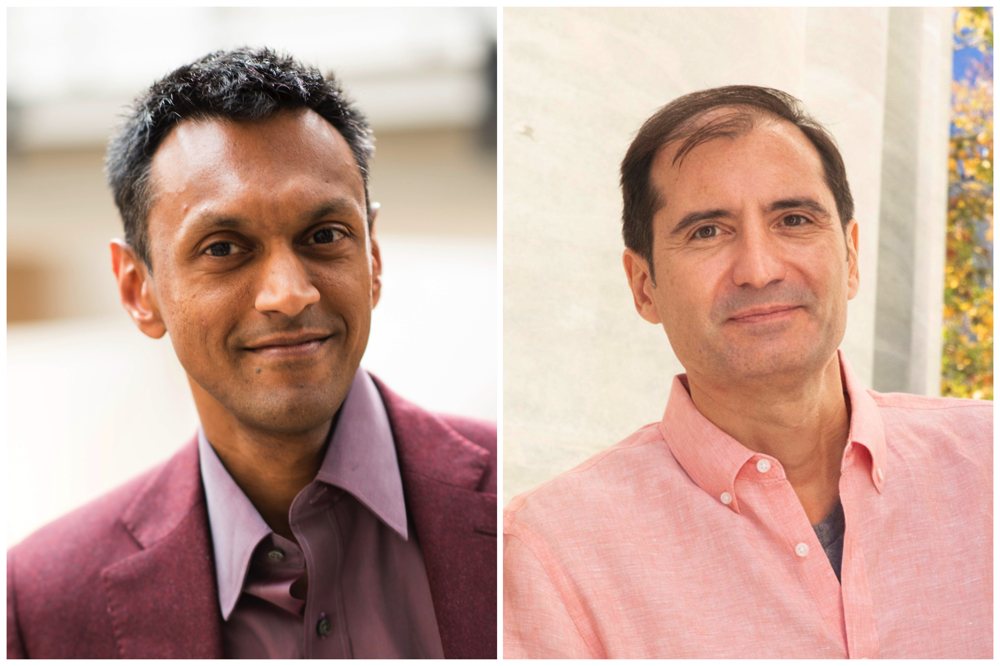Chan Zuckerberg Initiative co-founders and co-CEOs Mark Zuckerberg ’06, L.L.D. ’17 and Priscilla Chan ’07, announced today a gift to establish the Kempner Institute for the Study of Natural and Artificial Intelligence at Harvard. The new institute, which will have dedicated space in the recently completed Science and Engineering Complex in Allston (see “A 500-Year Building”), is named after Karen Kempner Zuckerberg, the mother of the Meta CEO and founder (Facebook, Instagram, and WhatsApp are Meta Platforms Inc.’s best-known apps) and her parents. According to Jeff MacGregor, vice president of science communications for the Chan Zuckerberg Initiative (CZI), the Kempner Institute will receive $500 million in funding during the next 15 years. The gift will support 10 new faculty appointments, new computing infrastructure, and resources for students—from undergraduates to post-doctoral fellows—that will allow them to pursue knowledge in an uninhibited way across labs and disciplines. Zuckerberg and Chan, a pediatrician, will donate an additional $2.9 billion to support biomedical research focused on improving human health, with the aim of ultimately ending all human disease. The couple, who met as Harvard undergraduates, pledged 99 percent of their Facebook equity to the initiative in 2015, when their first daughter was born, and launched their science program to end human disease the following year.
At Harvard, the Kempner Institute will be co-led by McKay professor of computer science Sham Kakade, of the University of Washington, who will join the Harvard faculty in January 2022, according to an October 20 announcement from the School of Engineering and Applied Sciences (SEAS); and by Harvard Medical School’s Moorhead professor of neurobiology Bernardo Sabatini. He has been a member of the medical school faculty since 2001, and became a Howard Hughes Medical Institute Investigator in 2008. The co-directors’ research thus melds the twin emphases of the institute’s mission, to seek fundamental principles that underlie both human and machine intelligence.
Kakade’s work explores the mathematical foundations of machine learning and artificial intelligence (AI). He is best known for helping create the foundational statistical framework for reinforcement learning, one of three basic machine-learning paradigms (the other two are supervised learning, which requires human intervention to create labeled datasets, and unsupervised learning, in which an algorithm uncovers patterns on its own). In reinforcement learning, the system adapts its behavior responsively to maximize a particular signal from its environment. According to the announcement released by SEAS when Kakade was hired, “His work spans economics, neuroscience, and applied and theoretical machine learning.” Kakade, who received his Ph.D. at the Gatsby Computational Neuroscience Unit, University College London, and his B.S. in physics at Caltech, is currently a professor of computer science and statistics at the University of Washington and Senior Principal Researcher at Microsoft Research.
Sabatini is a well-known developmental neurobiologist whose laboratory studies the mechanisms underlying synapse and circuit plasticity in living brains, an attribute that permits new behaviors to be learned and refined. His research group also studies how perturbations of normal synaptic function contribute to human neuropsychiatric disorders such as Parkinson’s and Alzheimer’s diseases.
Zuckerberg and Chan have a long history of philanthropy in education and health, and neurodegenerative disease has been a focus of their giving. They initially made large donations aimed at improving education in Newark, New Jersey, and in the San Francisco region, and to a local hospital and community foundation where they live in California. In 2015, they founded the Chan Zuckerberg Initiative (CZI), a limited liability company that allows them to make grants, invest, and engage in political advocacy in a way that a traditional charitable foundation could not. With this latest announcement they extend through 2031 their financial support of the CZ Biohub, a biomedical research collaboration involving Stanford, UCSF, and U.C. Berkeley, founded in 2016 with an initial gift of $600 million. They also announced plans to replicate this Biohub model elsewhere, by funding collaborative research into grand scientific challenges on 15-year time horizons, and to support creation of an interdisciplinary advanced biomedical imaging institute that will unlock “the ability to directly observe and analyze any biological process across spatial scales, in real time, throughout the human body,” said CZI science imaging program officer Stephani Otte.
Harvard president Lawrence S. Bacow said “Priscilla Chan and Mark Zuckerberg have demonstrated a remarkable commitment to promoting discovery, innovation, and service at Harvard and other academic institutions around the United States. Their support for the creation of the Kempner Institute will advance Harvard’s education and research mission and is only the most recent way in which they have sought to do so. From supporting the study of COVID-19 treatments and advancing literacy research, to boosting public service opportunities for undergraduates, they have shown a genuine commitment through their work at the Chan Zuckerberg Initiative and beyond to curing disease, improving lives, and encouraging others to serve.”
The premise of the Kempner Institute, according to a CZI statement, is that natural and artificial intelligence are “intimately interconnected:
the next generation of artificial intelligence requires using principles that our brains use for fast, flexible natural reasoning, and understanding how our brains compute and reason requires theories developed for AI. The Kempner Institute will study AI systems, including artificial neural networks, to develop both principled theories and a practical understanding of how they operate and learn, and it will also focus on research topics that include learning and memory, perception and sensation, brain function, and meta plasticity.
The Institute will recruit and train future generations of researchers from undergraduates and graduate students to post-docs and faculty—actively recruiting from underrepresented groups at every stage of the pipeline—to study intelligence from biological, cognitive, engineering, and computational perspectives.”
Institute co-director Sabatini said in a statement that understanding of the complex neuronal networks of human brains is expanding rapidly, given new technologies and methodologies. “This new program will bring the fields together by, for example, borrowing features from biological brains to make smarter AI and using computational theories from AI to explain how our brains work.”

Kempner Institute Co-Directors Sham Kakade and Bernado Sabatini
Photograph of Sham Kakade courtesy of Sham Kakade; photograph of Bernado Sabatini by Kris Snibbe / Harvard Public Affairs and Communications
In an interview, Sabatini and Kakade said that their first priority will be to assemble an ecosystem of scientists and scholars, and then to define 10 grand challenges in the field of intelligence. Among the kinds of questions that might be pursued, explained Sabatini, is what happens when an artificial neural network is endowed with features from the human brain such as a diversity of cell types, or with the type of neurons that researchers believe perform computation? Working the other direction, do theories about computation in artificial neural networks apply to biological intelligence?
Human intelligence already encompasses the three principal machine learning paradigms—supervised, unsupervised, and reinforcement learning—Kakade and Sabatini pointed out. “Clearly, learning which foods you like and dislike is a process akin to reinforcement learning,” Sabatini elaborated, “but learning to walk is largely an unsupervised project. A baby will try to get up on its feet and stumble…but ultimately learn how to do that on its own.” Learning a language—language is a particular interest of Kakade’s—has components of both supervised and unsupervised learning, as when a baby practices on its own.
There is a modularity to human natural intelligence, said Kakade. Each approach has evolved to become optimal for certain types of problems. But as Sabatini pointed out, “We don’t yet really understand why—and how to use that information.”
Bacow said that the Kempner Institute represents “a remarkable opportunity to bring together approaches and expertise in biological and cognitive science with machine learning, statistics, and computer science to make real progress in understanding how the human brain works to improve how we address disease, create new therapies, and advance our understanding of the human body and the world more broadly.”
To put the Kempner Institute into some perspective, the prorated funding—$33 million annually for 15 years—represents more than 10 percent of the total nonfederal sponsored research support (about $300 million in fiscal year 2021, including both direct research spending and coverage of indirect expenses) the University now receives each year.
Read the full CZI announcement here.









